The entire information of plenary presenters and talks are now published!
Dr. Tianyou Chai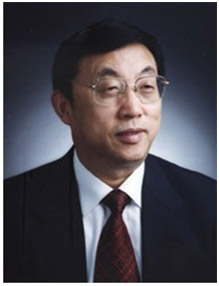
Chair Professor
Member of the Chinese Academy of Engineering
IEEE Fellow, IFAC Fellow
Northeastern University
Shenyang, China.
Title: Intelligent Feedback Control for Operation of Complex Industrial Processes
Abstract: Process control should aim at not only ensuringcontrolled variables to bestfollow their set points, but also requiring the optimal control for the operation of the wholeplant to make the operational indices (e.g. quality, efficiency and consumptions during theproduction phase) into their targeted ranges. It also requires that operational indices forquality and efficiency should be enhanced as high aspossible, whilst the indices related toconsumptions are kept at their lowest possible level. Based upon a survey on the existingoperational optimization and controlmethodologies, this talk presents a data-driven hybridintelligent feedback control for operation of complex industrial processes and a hybrid simulationsystem. Simulations and industrial applications to a roasting process for the hematite ore mineralprocessing industry are used to demonstrate the effectiveness of the proposed method. Issues forfuture research on the optimal operational control for complex industrial processes are outlinedin the final section.
Short Bio: Dr. Tianyou Chai received the Ph.D. degree in control theory and engineering in 1985 from Northeastern University, Shenyang, China, where he became a Professor in 1988. He is the founder and Director of the Center of Automation, which became a National Engineering and Technology Research Center and a State Key Laboratory. He is a member of Chinese Academy of Engineering, IFAC Fellow and IEEE Fellow, director of Department of Information Science of National Natural Science Foundation of China.
His current researchinterests include modeling, control, optimization and integrated automation of complex industrial processes.
He has published 150 peer reviewed international journal papers. His paper titled Hybrid intelligent control for optimal operation of shaft furnace roasting process was selected as one of three best papers for the Control Engineerig Practice Paper Prize for 2011-2013. He has developed control technologies with applications to various industrial processes. For his contributions, he has won 4 prestigious awards of National Science and Technology Progress and National Technological Innovation, the 2007 Industry Award for Excellence in Transitional Control Research from IEEE Multiple-conference on Systems and Control.
Dr. Kazuhiro Kosuge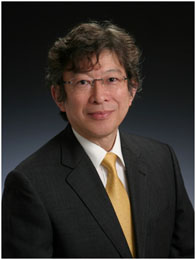
Professor
IEEE Fellow, JSME Fellow, SICE Fellow, RSJ Fellow
Department of Bioengineering and Robotics
Graduate School of Engineering
Tohoku University
Sendai, Japan
Title: Toward Universal Manipulation
Abstract: The increase in the number of industrial robots used in factories is modest compared to the current needs of the industrial robots in many different fields. It is partially because we do not have enough number of systems integrators/engineers, who design robot systems or cells in order to install the robots for specific applications. Different from human workers, the industrial robots require a lot of peripheral systems specifically designed for given tasks, such as robot hand(s)/gripper(s), fixture(s), parts feeders, smart tools, etc. The current industrial robots, originally designed for universal automation, are far from the “universal.” In this presentation, we are going to introduce the concept of the universal manipulation and some of the recent research results. The ultimate goal of the universal manipulation is to create a robot system, which executes different tasks using general-purpose tools without designing peripheral systems for each task, without using parts feeders, and without programing of the robots. We discuss the issues for realizing the universal manipulation and introduce some of the solutions for the issues, which include new design of multi-purpose robot hands, integrated control system of visual and impedance servo, teaching by demonstration and so on.
Short Bio: Dr. Kazuhiro Kosuge is a Professor in the Department of Bioengineering and Robotics at Tohoku University, Sendai, Japan. He received the B.S., M.S., and Ph.D. in control engineering from the Tokyo Institute of Technology, in 1978, 1980, and 1988 respectively. From 1980 through 1982, he was a Research Staff in the Production Engineering Department, Nippon Denso Co., Ltd. (DENSO Co., Ltd. at present). From 1982 through 1990, he was a Research Associate in the Department of Control Engineering at Tokyo Institute of Technology. From 1990 to 1995, he was an Associate Professor at Nagoya University. From 1995, he has been at Tohoku University. He received the JSME Awards for the best papers from the Japan Society of Mechanical Engineers in 2002 and 2005, the RSJ Award for the best papers from the Robotics Society of Japan in 2005. He is an IEEE Fellow, a JSME Fellow, a SICE Fellow and RSJ Fellow. He served as President of IEEE Robotics and Automation Society for 2010-2011 and is serving as a senior past president of IEEE Robotics and Automation Society for 2014-2015. He is currently serving as Division X Director, IEEE for 2015-2016.
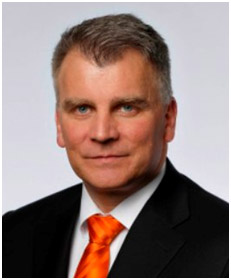 Dr. Ralf Koeppe
Dr. Ralf Koeppe
VP Engineering and Manufacturing
Electric Drives and Controls
Bosch Rexroth AG
Title: Building Advanced Industrial Robot Systems
Abstract:Robotics automation and industrial robotics has become a global trend. Advanced industrial robots can be divided into two categories: (1) High performance machines that can manipulate and move large weights and volumes at a high speed and accuracy, and (2) human-robot collaborating systems that can be programmed to safely interact with human and perform advanced complaint motion tasks. To be competitive in the market, both categories of robot machines require an advanced system design approach. Examples of such advanced robotic systems and applications will be presented. The ability to customize advanced control and drive components with open interfaces, and the availability of exact models of the mechatronic component behavior becomes a critical success factor.
Short Bio: Dr. Ralf Koeppe joined Bosch Rexroth AG as Vice President Engineering and Manufacturing in December 2014. He is responsible for R&D and production of Rexroth’s electric drive, motors and controller products including Rexroth’s China based R&D and manufacturing hub in Xi’an. Before he joined Bosch Rexroth, Ralf Koeppe was with KUKA from 2002 to 2014. As Vice President R&D he was responsible for the development of KUKA industrial robotics products e.g. KUKA’s Quantec robot, the Titan robot, and the KR C4 control (KUKA Robotics 2005-2010) and the human-robot collaboration products LBR iiwa, KUKA Sunrise OS, Mobile Robotics and Navigation, and Medical Robotics (Advanced Robotics Division 2011-2014). From 1992 to 2002 Ralf Koeppe was with the Institute of Robotics and Mechatronics at the German Aerospace Center (DLR) where he worked on intelligent sensory robot control, human robot skill transfer and telepresence systems. He received the “Master of Science” degree in Mechanical Engineering from Portland State University, Oregon (1989), the DiplomIngenieur degree in Mechanical Engineering from University of Stuttgart (1992), and the doctorate degree in Technical Sciences from Swiss Federal Institute of Technology, ETH Zürich (2002). Since 2005, he holds a lecture position at the University of Stuttgart in the field of robotics. He received the Georges Giralt Ph.D. Award (2002), the DLR Innovation Award (2002), the IEEE Robotics & Automation Industry Early Career Award (2008), the euRobotics Technology Transfer Award (jointly with DLR in 2011), and the Leonardo da Vinci Award of the AssociazioneItalianaProgettistiIndustriali, AIPI for leading the development of LBR iiwa (2014).
Dr. Ping Zhang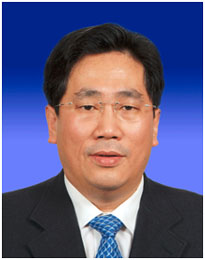
Professor and Director
Center for Electrical Circuits and Systems
Beijing University of Posts and Telecommunications
Beijing, China
Title: New Generation Wireless Network for CYBER’s Era
Abstract: For 2020 and the business needs of the future mobile Internet and the Internet of Things,5G will use many core technologies including massive MIMO, ultra-dense networking, new multiple access, high frequency communications, full duplex and new network architectures and so on. In ultra-high traffic density, ultra-high connection density, ultra-high mobility scenarios, the network will meet future ultra-thousand fold mobile data growth, provide fiber-like access data rate and “zero” latency user experience and ability to connect 100 billion devices. At the same time, it will bring super hundred fold energy efficiency improvements and bit cost reductions, eventually build the full join ecosystem which enables “message transmitted arbitrarily and everything tentacle freely”.
Short Bio: Ping Zhang, Ph.D, isa Professor of Beijing University of Posts and Telecommunications, Vice director of Science Bulletin (published by Chinese Academy of Science), Expert of MIIT major special technological programs, Member of IMT-Advanced (4G) Group, Consultancy expert of NSFC (National Science Foundation Committee).
Prof. Zhang published 8 books till now. He also acts as the vice editor-in-chief of History of China’s Telecommunication Discipline organized by CIC (China Institute of Communications) and invited to participate in the publishing of Long Term Evolution, and invited to write the book Cognitive Radio Networks, published by Science publishing Company in 2010.
Prof. Zhang has published more than 400 papers both at home and abroad publications, such as IEEE Communications Magazine, IEEE Electronics Letters, Chinese Journal of Electronics. And he holds about 170 patents.
Dr. Dennis Hong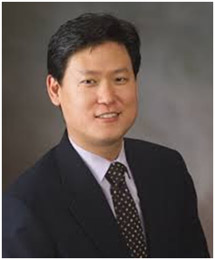
Professor and the Founding Director
RoMeLa (Robotics & Mechanisms Laboratory)
Mechanical & Aerospace Engineering Department
University of California Los Angeles
Title: Humanoids: From Kicking a Ball to Saving Lives
Abstract: Can humanoid robots save lives? Will they have the capacity to be our friends? Hear how Dennis Hong, founding director of UCLA's Robotics & Mechanisms Laboratory, is making this happen and meet some of his groundbreaking robots; “DARwIn,” the hugely successful open source miniature humanoid robot for research and education; “CAHRLI,” the United States’ first full size autonomous humanoid robot with a goal of defeating the human WorldCup champions in soccer by the year 2050; “SAFFiR,” a firefighting humanoid robot being developed for the US Navy; and “T.H.O.R.,” the super hero humanoid robot for disaster relief which will one day save the world.
Short Bio: Dr. Dennis Hong, a TED alumnus, is a Professor and the Founding Director of RoMeLa (Robotics & Mechanisms Laboratory) of the Mechanical & Aerospace Engineering Department at UCLA. He is the inventor of a number of novel robots and mechanisms, including the ‘whole skin locomotion’ for mobile robots inspired by how amoeba move, a unique three-legged waking robot STriDER, an air-powered robotic hand RAPHaEL, and the world’s first car that can be driven by the blind. His work has been featured on numerous national and international media. Washington Post magazine called Dr. Hong “the Leonardo da Vinci of robots.” Dr. Hong has been named to Popular Science’s 8th annual “Brilliant 10”, the National Science Foundation’s CAREER award, the SAE International’s Ralph R. Teetor Educational Award, and the ASME Freudenstein / GM Young Investigator Award.
Links For Dennis Hong’s TED Talk:
Making a car for blind drivers
http://www.ted.com/talks/dennis_hong_making_a_car_for_blind_drivers
My seven species of robot
http://www.ted.com/talks/dennis_hong_my_seven_species_of_robot
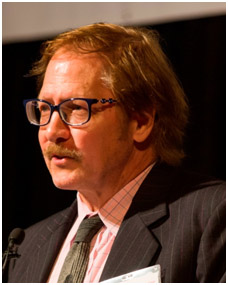 Dr. Michael Pecht
Dr. Michael Pecht
IEEE Fellow, ASME Fellow, SAE Fellow and IMAPS Fellow
Chair Professor and Director
Center for Advanced Life Cycle Engineering (CALCE)
University of Maryland
Title:Systems Health Monitoring and Management within the Internet of Things
Abstract: Systems health monitoring is a method within the concepts of the Internet of Things, which permits the assessment of a system under its actual application conditions. It integrates sensor data with models that enable in-situ assessment of the “health” (e.g. deviation or degradation) of a system from an expected normal operating condition and also predicts the future state of the system based on current and historic conditions. This presentation discusses some methods used for anomaly detection and prognostics, including the monitoring and reasoning of parameters that are precursors to impending “failure”, such as shifts in performance parameters; and the modeling of stress and degradation utilizing life cycle loads. Various examples of actual implementation methods and results are given.
Short Bio: Dr. Michael Pecht is a world renowned expert in strategic planning, design, test, and risk assessment of information systems. Prof Pecht has an MS in Electrical Engineering and an MS and PhD in Engineering Mechanics from the University of Wisconsin at Madison. He is a Professional Engineer, an IEEE Fellow, an ASME Fellow, an SAE Fellow and an IMAPS Fellow. He is the editor-in-chief of IEEE Access, and served as chief editor of the IEEE Transactions on Reliability for nine years, chief editor for Microelectronics Reliability for sixteen years. He is the founder and Director of CALCE (Center for Advanced Life Cycle Engineering) at the University of Maryland, which is funded by over 150 of the world’s leading electronics companies at more than US$6M/year. The CALCE Center received the NSF Innovation Award in 2009. He is currently a Chair Professor in Mechanical Engineering and a Professor in Applied Mathematics at the University of Maryland. He has written more than twenty books on product reliability, development, use and supply chain management. He has also written a series of books of the electronics industry in China, Korea, Japan and India. He consults for 22 international companies. He has written over 700 technical articles and has 7 patents. In 2013, he was awarded the University of Wisconsin-Madison’s College of Engineering Distinguished Achievement Award. In 2011, he received the University of Maryland’s Innovation Award for his new concepts in risk management. In 2010, he received the IEEE Exceptional Technical Achievement Award for his innovations in the area of prognostics and systems health management. In 2008, he was awarded the highest reliability honor, the IEEE Reliability Society’s Lifetime Achievement Award. He has previously received the European Micro and Nano-Reliability Award for outstanding contributions to reliability research, 3M Research Award for electronics packaging, and the IMAPS William D. Ashman Memorial Achievement Award for his contributions in electronics analysis.
